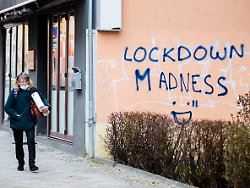Thursday March 25, 2021
Despite the rapidly increasing incidence
Müller waives the emergency brake in Berlin
Berlin relies on vaccination and testing instead of withdrawing opening steps. Despite the increasing number of infections, Prime Minister Müller is dispensing with the agreed emergency brake. When vaccinating, he wants to make prioritization more flexible.
Berlin is not taking back the cautious opening steps of the past few weeks despite the sharp rise in the number of corona infections. “I believe that it is not a viable option to turn back everything that we have fought for in the last few days and weeks in terms of opportunities and freedoms,” said Governing Mayor Michael Müller of the SPD in a government statement in the House of Representatives. Rather, vaccination and testing open up new possibilities so that one no longer has to react exclusively with restrictive measures as in the past.
Müller moved away from the federal-state decision on a so-called emergency brake, which was reaffirmed during the consultations with Chancellor Angela Merkel on Tuesday night. Accordingly, if the incidence of more than 100 new infections per 100,000 inhabitants is stable, loosening would have to be withdrawn within seven days.
In regions with an incidence of over 100, according to the federal-state resolution, restrictions should even be tightened. In Berlin, the seven-day incidence on Wednesday was 118.2 after 102.3 the previous day.
Müller questions vaccination prioritization
In addition, Müller promised faster vaccinations for younger people. Sooner or later the point will come when it is necessary to talk about giving up the previous vaccination prioritization and setting new priorities, he said. The scientists with whom the Senate is in discussion recommend breaking the chains of infection in particularly mobile population groups.
“What does that actually mean? That we may now have to discuss whether we should next include the students or trainees or other younger people in our vaccination strategy and vaccinate accordingly faster,” said the SPD politician.
“And I know what will happen then, there will be another discussion about privileges and injustices,” said Müller, who at the same time pointed out that there was currently still a lack of sufficient vaccine. “We’re managing a shortage here at the moment. And we’re doing it as best we can. We could do 20,000 vaccinations a day and only get 10,000 vaccinations,” said the mayor. “There is still too little vaccine that we have available. We must therefore see how we can use these vaccines more flexibly until we get more capacity.”
.
